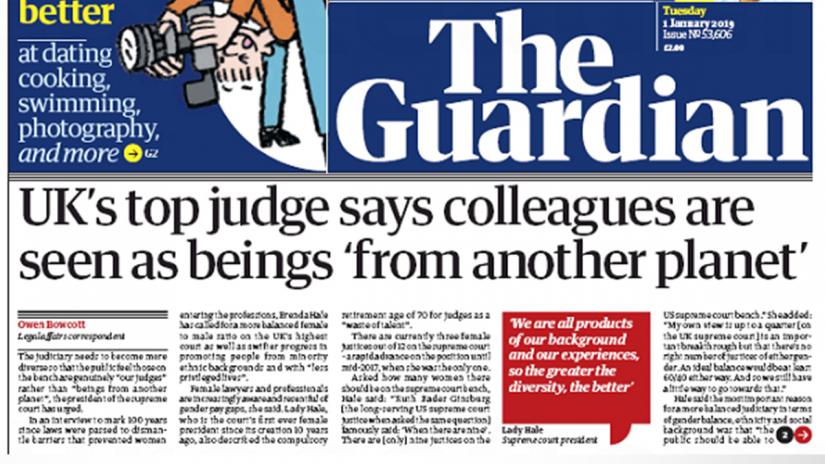 The judiciary needs to become more diverse so that the public feel those on the bench are genuinely “our judges” rather than “beings from another planet”, the president of the supreme court has urged.
The judiciary needs to become more diverse so that the public feel those on the bench are genuinely “our judges” rather than “beings from another planet”, the president of the supreme court has urged.
In an interview to mark 100 years since laws were passed to dismantle barriers that prevented women entering the professions, Brenda Hale has called for a more balanced female to male ratio on the UK’s highest court as well as swifter progress in promoting people from minority ethnic backgrounds and with “less privileged lives”.
Female lawyers and professionals are increasingly aware and resentful of gender pay gaps, she said. Lady Hale, who is the court’s first ever female president since its creation 10 years ago, also described the compulsory retirement age of 70 for judges as a “waste of talent”.
There are currently three female justices out of 12 on the supreme court – a rapid advance on the position until mid-2017, when she was the only one.
Asked how many women there should be on the supreme court bench, Hale said: “Ruth Bader Ginsburg [the long-serving US supreme court justice when asked the same question] famously said: ‘When there are nine’. There are [only] nine justices on the US supreme court bench.” She added: “My own view is up to a quarter [on the UK supreme court] is an important breakthrough but that there’s no right number of justices of either gender. An ideal balance would be at least 60/40 either way. And so we still have a little way to go towards that.”
Hale said the most important reason for a more balanced judiciary in terms of gender balance, ethnicity and social background was that “the public should be able to look at the judges and say ‘they are our judges’” rather than seeing them as “some sort of beings from another planet”.
In the high court, court of appeal and supreme court, a quarter of judges are women. Among district judges, around a third are female. Diversity, Hale said, also helped by bringing “different perspectives to the discussion”. “We are all products of our background and our experiences, so the greater the diversity, the better.”
Having more than one woman on the supreme court had demonstrated that “women are as different to one another as men are” she said, acknowledging that it had been refreshing to sit with other women.
While overt discrimination is illegal, there remain hurdles to overcome. “We do have in this country a gender pay gap to worry about,” she said. “The more pay is [delivered] through individual negotiation rather than collective agreement, the greater the risk of imbalance. [Women] are just waking up to the fact that they are not being paid as much.”
Sexual harassment has also caused problems for women at the Bar, Hale said. She had not personally experienced problems, she said, but was aware of its sexist culture – at least in the past. “I do recall that when I was being elected to the northern circuit they required young women being elected to get on the table [as an initiation rite],” she said. “They didn’t require me to get on the table. [I don’t know] whether they thought I could not get up or whether [it was because] I was married to a member of the circuit.” More progress was needed in advancing those from minority ethnic backgrounds into the higher judiciary, Hale said. “It’s not surprising that it’s slower. It’s [only] more recently that members of ethnic minorities have joined the legal profession in larger numbers. Although there’s definitely a way to go [the discrepancy] may not be as bad as we thought.”
There is already a strong presence of minority ethnic judges in tribunals, county courts and among district judges, she said. “The way we can try and improve diversity in the higher echelons [of the judiciary] is being more open to transfers from other [courts]. And there have been appointments from the upper tier [tribunals] to the high court. So that is beginning to happen [though] it’s still quite slow.”
She hoped the judiciary would attract “more people who have had less privileged lives”. Hale added: “I have had a privileged life [but] I don’t come from a privileged background and that is helpful.”
Hale does not approve of positive discrimination because “no one wants to feel they have got the job in any way other than on their own merits”. Better outreach efforts to encourage candidates are more productive, she said.


